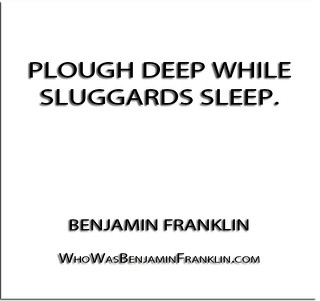■ We wind up Chapter 24 of Proverbs with a five-verse extravaganza.
Ladies and gents, turn your attention to
Proverbs
24:30-34:
30 I went past the field of a sluggard,
past the vineyard of someone who has no sense;
31 thorns had come up everywhere,
the ground was covered with weeds,
and the stone wall was in ruins.
32 I applied my heart to what I observed
and learned a lesson from what I saw:
33 A little sleep, a little slumber,
a little folding of the hands to rest—
34 and poverty will come on you like a thief
and scarcity like an armed man.
Chapter 24 was kind of a cut-and-paste job, with no overall theme or
internal logic, and the quality was uneven. But this is kind of
moving. Although I'm not sure how the Proverbian jumps from the fact
that his countryman was a "sluggard" with "no sense" to his overall conclusion that
your prosperity can be wrecked by a few moments of inattention.
Still.
Our photo embed du jour is from Ben Franklin, with more or less
the same idea.
■ A painful, but probably worthwhile debate at National
Review between John McWhorter and Robert VerBruggen. First,
Professor McWhorter urges us to Stop
Obsessing Over Race and IQ.
Is the issue of whether IQ differs innately between races as
unequivocally settled as that of whether genocide is okay? If not,
does it fit into the class of things that ought to be up for
discussion? In fact, I suggest that race and IQ is an exceptional
topic, in the literal sense. The data are not all in, yet I see no
value in including this topic in our liberal-arts discussions.
Certainly scientists will research the topic and will share their
findings, which will always be available online for those
interested. However, those aggrieved that this particular issue is
not aired more widely in general discussion need to make their
premises clearer — upon which, I suggest, those premises will seem
less convincing than they are aware.
And the counterpoint from VerBruggen is here: Why I Write about Race and IQ
[…] I rather doubt that an effort to further stigmatize the discussion
of race and IQ could have more than a minor effect on how often
people actually discuss it. And even if people did stop discussing
it openly, I suspect many would still become curious about the
topic and research it online, where people feel considerably freer
to explore the taboo. This subject sits at the nexus of numerous
others that are inherently interesting, for perfectly legitimate
reasons. How did evolution shape humanity as a whole, and to what
extent did it shape different populations differently? Why do we
have such stark inequality among different groups of people, and
not just blacks and whites in the U.S.?
I think that VerBruggen has the better argument here, but both
writers make excellent and thoughtful points.
■ At Reason, Andrew Heaton explores a burning topic: Why
Society Hates Entrepreneurs.
We're fickle about entrepreneurs, at least if they actually become
successful. Whether or not they add value to society is beside the
point.
When they're handsome and charismatic entrepreneurs are "innovators" and "game changers." They get invited to sex parties in Davos. If they're homely or awkward, they are merely wealthy drivers of inequality, and thus, evil.
That's because our culture simultaneously hates rich people but loves celebrities. When entrepreneurs manage to become celebrities, they are exempted from socialist tirades.
A helpful Venn diagram is included at the link. Heaton is, among
other things, a professional comedian. Don't let that dissuade you.
■ Philip Greenspun went to to the Aero Club of New England‘s annual
Cabot Award luncheon, where the honoree was Harrison Ford. You know,
the actor? And the famously irascible Mr. Ford had interesting
things to say, recounted here:
Harrison
Ford on flying and freedom. Phil's favorite bit:
- Q: were you ever scared?
- A (in front of 300 people): I’m scared right now.
Looking back at Mr. Ford's
movies, it's tough
to pick a favorite. He's been great in his iconic roles, but I'll
watch The Fugitive just about anytime.
![[Amazon Link]](/ps/asin_imgs/0425246914.jpg)
![[Amazon Link]](/ps/asin_imgs/B01K7PUHAA.jpg)

![[The Blogger and His Dog]](/ps/images/me_with_barney.jpg)



